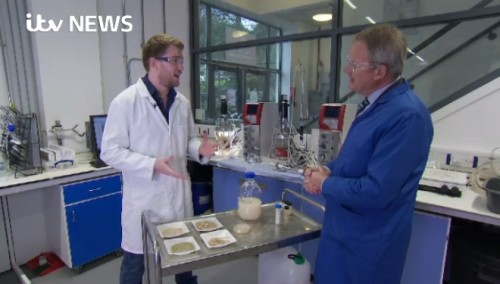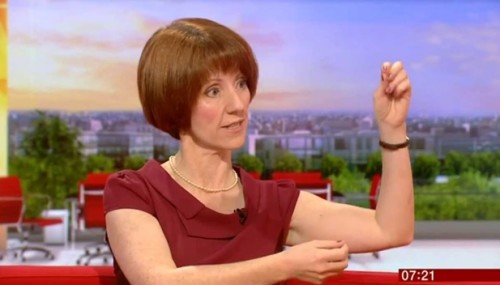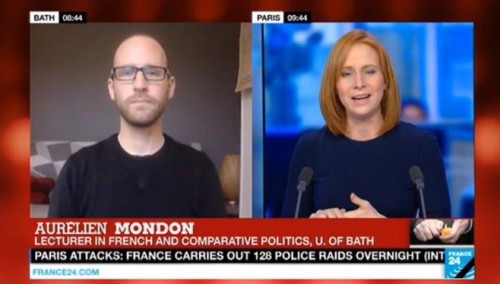Last week I ran a Public Engagement Conversation on using the media to promote your research and expertise.
At the event I was joined by a panel of academic media experts - Professor Carole Mundell, Dr Aurélien Mondon and Dr Chris Chuck - each able to share their experiences of media interviews and the benefits of greater engagement, and by journalist and broadcaster - Jheni Osman.
The thinking behind the event was to equip the audience, made up predominately of postgraduate and early career researchers, with new ideas about getting the media interested in research stories and some practical next steps on bringing this about, including by working closely with our press office.
Extending the reach of research
As a researcher, at whatever level, media engagement can help you reach new audiences way beyond academia. It’s a pathway to impact and in today’s competitive world can help you deliver important results.
Increased profile can help to increase citations for your research, can lead to new collaborations, and of course can be useful evidence when evaluating how you’ve disseminated your research to funders. What’s perhaps less well understood is how the process of media engagement can actually help shape your existing research and future research trajectory, and can give you useful feedback as your projects develop.
People talk of an inverted pyramid of news, which presents the most salient, newsworthy findings first before going into the detail of the research. This is the trick for presenting academic findings to non-specialist audiences and is core to any engagement activity. Being clear about the ‘hook’ of your research, why people outside of academia should care about it, is what you need to think of when looking at media dissemination. It’s the kind of thing the press team and the Public Engagement Unit can certainly help with.
Planning publicity around your research

Most of the media work you’re likely to be involved in will be proactive around new research findings or new funding.
In this instance, you have the luxury of time and can work iteratively with the press office on devising a press release and securing appropriate channels for media coverage. We discussed how it’s often a good idea to line up a comment article, for instance via The Conversation, to coincide with a more general release.
Such coverage around specific research projects can be particularly useful in terms of dissemination to a wide range of stakeholders, as Chris Chuck explained in relation to the release last year of news of funding to develop a yeast alternative to palm oil.
Being called upon to give expert comment

From time to time, you may be called on to give expert comment in relation to a news story. This can be a great way to develop a media profile around a theme and can have important research benefits in its own right. It’s something Carole Mundell has experienced a number of times, in particular for the BBC across most channels and stations.
In these instances, where you’re asked to comment on someone else’s research, Carole underlined that it’s absolutely essential to go back to the original source for the story - for example an academic paper - rather than relying on a press release.
Carole's experiences serve as a reminder of how local news can often feed into the national news cycle: Most recently, in relation to leap years, her comments for BBC Somerset were picked up by BBC 5Live and World Service leading to high-profile interviews. If you do have to turn down an invitation to comment for whatever reason, she suggested to frame it as “no, but please ask me again in the future” in order to show willing.
Reacting to breaking news

Occasionally, dependent on your research area, you might be called to give expert comment in response to breaking news and external events. Again this can be a useful way of profiling your work and expertise when it aligns, but there are important factors to bear in mind.
Aurélien Mondon has provided expert comment in relation to a number of breaking news events, most recently in response to the terrorist attacks in Paris last November. His advice was to avoid rushing into comment without the full details but at the same time to be quick off the mark if you have something to say.
Aurélien’s comments, including his Conversation article which was the first on the topic following the events, were picked up by national and international media, and he had numerous requests for TV and radio interviews. When this happens, the press team can help again in terms of managing media requests.
5 things you can do now
If you’re interested in using the media to promote your research and expertise here are five things you can do now.
- Make contact with the University’s press office via press@bath.ac.uk and arrange to meet the press officer who covers your Faculty or School.
- Sign up for the University’s daily headlines email to get a sense of what else is making the news.
- Have a look at The Conversation website and think about the kind of piece you could write for them (I’ll blog separately about the Conversation soon).
- Think about tailored media training organised via our RDU. The next session with spaces is on Wednesday 29 June.
- Read through our social media toolkit to see how social channels, from Twitter to Google Scholar, can help at the same time.
And please don't hesitate to get in touch if you have any other questions!
Respond



